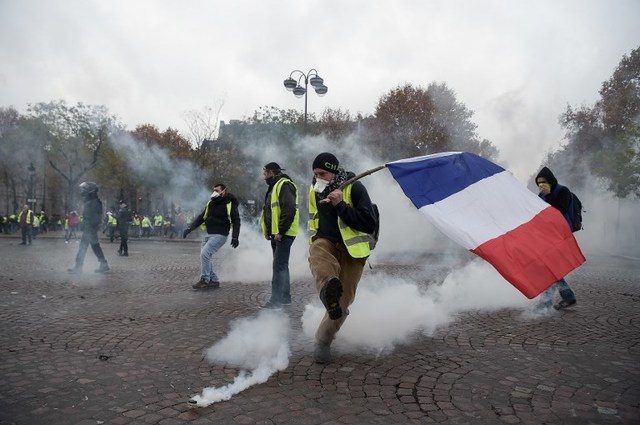SUMMARY
This is AI generated summarization, which may have errors. For context, always refer to the full article.

PARIS, France – The French government has pledged a range of measures to end weeks of demonstrations over taxes and declining standards of living.
But who exactly makes up the “yellow vest” movement, and will the government be able to quell their anger after a month of increasingly fiery protests?
Who are the protesters?
The “gilets jaunes” (yellow vest) movement sprang up in late October against increases in fuel taxes announced as part of President Emmanuel Macron’s efforts to pay for clean energy initiatives.
While the protests began over fuel taxes, they have snowballed into a wider movement against Macron, largely among people in small-town and rural France.
Many accuse the former investment banker of being an arrogant “president of the rich” who is out of touch with the struggles of ordinary people in the provinces.
Donning the luminous safety vests French drivers are required to carry in their cars, the protesters have blocked motorways and petrol depots since their first Saturday of demonstrations on November 17.
Many have continued to man blockades since then, playing havoc with traffic and causing fuel shortages ahead of the busy holiday season.
Organizers have called protests every Saturday since, which degenerated last weekend into running battles with police in Paris, where more than 200 vehicles were burned and 412 people arrested.
What do they want?
Different protesters have different aims, and there is no widely recognized group of leaders for the grassroots movement which took root on social media.
Some remain focused on lowering fuel taxes and other financial burdens, saying low-income families in particular are paying the price for Macron’s push to reform and revive the French economy.
Others have made it personal and say Macron must resign, still fuming over his decision to cut taxes for the highest earners shortly after sweeping to the presidency last year.
An immediate increase in the minimum wage and pension benefits has also been a rallying cry.
Underpinning the movement is a widespread complaint that overlooked provincial workers on modest incomes barely scrape by after paying some of the highest tax bills in Europe.
An apolitical movement with members who vote for parties of various stripes, the “yellow vests” have won support from everyone from far-right leader Marine Le Pen to far-left firebrand Jean-Luc Melenchon.
Why do they pose a challenge?
The government has admitted it failed to appreciate the depth of the anger, and has announced it will cancel a fuel tax hike set for January, of 7 euro cents for diesel and 3cents for unleaded.
Coming increases for electricity and gas prices were also frozen, as were new vehicle inspection norms which would have hit users of older diesel cars.
The moves were dismissed by protesters – and Macron’s political opponents – as too little, too late.
Since then Prime Minister Edouard Philippe has floated the idea of a bonus payment for low-paid workers.
But efforts to negotiate have gone nowhere, not least because the movement’s purported leaders have largely declined invitations to talks – some because they were threatened by other “yellow vests.”
Adding to the government’s headache, the movement has retained solid public support despite scenes of chaos in the capital last weekend.
Opinion polls show 70 to 80 percent of respondents backing the protesters, even as Macron’s approval ratings plunged to record low of 23 percent in an Ifop-Fiducial survey this past week.
And protesters have remained adamant they won’t back down now.
“This movement has revealed how millions of French people live,” said Jacline Mouraud, whose YouTube tirade in October over rising fuel prices propelled her to the fore of the revolt.
“It’s no longer a source of shame to admit that you can’t make ends meet at the end of every month,” she said in interview with French daily Le Figaro on Friday. – Rappler.com
Add a comment
How does this make you feel?
There are no comments yet. Add your comment to start the conversation.